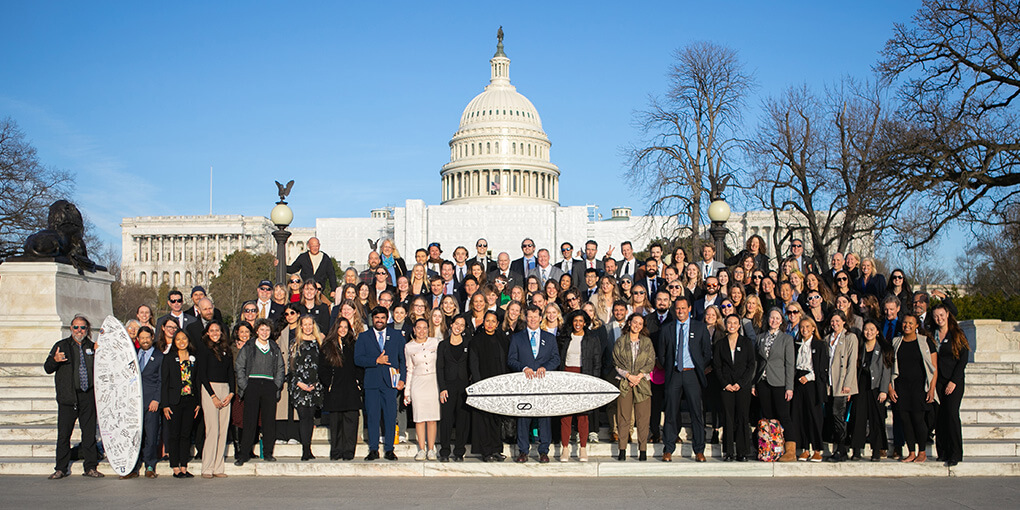
06.11.24
Building Congressional Support for Clean Water and Healthy Beaches through the BEACH Act
By Mara DiasIn the years leading up to the initial passage of the BEACH Act of 2000, Surfrider Foundation activists could be found schlepping a surfboard around Capitol Hill to build awareness and support for the bill which established the first national program dedicated to monitoring water quality and protecting public health at U.S. Beaches. The BEACH Act gave authority to the Environmental Protection Agency to set national standards for state beach water quality monitoring and public notification programs and it established a federal grant program to help states run these programs. Learn more about the history of the BEACH Act here. Originally authorized at $30 million per year (the maximum level that Congress is allowed to allocate to the program in any given year), federal funding for the EPA’s BEACH Act Grants program has remained nearly stagnant at approximately $10 million for the past 20 plus years. With cost-of-living and inflation obviously experiencing a significant upward trend over the same time period, this has forced program managers in coastal states to make difficult decisions on which beaches they are able to monitor with their limited federal grants, how often they are able to sample and how long their beach seasons will last. This has resulted in gaps in coverage in every coastal state, where the most popular, life-guarded beaches typically are tested weekly during the peak summer season only, leaving ocean recreation unprotected for much of the year and at some beaches entirely.
Originally authorized at $30 million per year (the maximum level that Congress is allowed to allocate to the program in any given year), federal funding for the EPA’s BEACH Act Grants program has remained nearly stagnant at approximately $10 million for the past 20 plus years. With cost-of-living and inflation obviously experiencing a significant upward trend over the same time period, this has forced program managers in coastal states to make difficult decisions on which beaches they are able to monitor with their limited federal grants, how often they are able to sample and how long their beach seasons will last. This has resulted in gaps in coverage in every coastal state, where the most popular, life-guarded beaches typically are tested weekly during the peak summer season only, leaving ocean recreation unprotected for much of the year and at some beaches entirely.
 A South Sound BWTF volunteer collects a water sample in Puget Sound in Washington
A South Sound BWTF volunteer collects a water sample in Puget Sound in Washington
Surfrider’s national network of volunteer-run chapters fill in these gaps in their local communities with their Blue Water Task Force (BWTF) water testing programs, monitoring ocean beaches, estuaries, intercostal waterways, harbors, creeks and rivers throughout the year – basically anywhere that people enjoy swimming, surfing, paddling or otherwise playing in the water. While BEACH Act funded agency programs monitor just over 3500 beaches nationwide, the BWTF tested 567 beaches and coastal waterways in 2023 to extend public health protection in their communities. The efforts of these amazing volunteers, however, cannot fill all of the gaps left by the agency-run beach programs and this is why advocating for more funding in Congress for the BEACH Act has been one of the Surfrider Foundation’s federal priorities since the President’s Budget first proposed completely eliminating funding for this program in 2012. Earlier this year, during our 8thAnnual Coastal Recreation Hill Day over 160 chapter and student club leaders met with 142 Congressional offices asking for their support to increase the federal funding level for the BEACH Act to at least $15 million (half of the fully authorized level). We believe this would allow states to start filling in their program gaps by testing more beaches, more often, and is certainly a small and wise investment to safeguard beach-dependent tourism economies that are worth over $150 billion nationwide.

Volunteers and staff meet with their elected officials in Congress to discuss the Surfrider Foundation's federal priorities during our annual Coastal Recreation Hill Day.
We were thrilled to see these advocacy efforts pay off when Representatives Pallone (NJ) and Posey (FL) lead a bipartisan Dear Colleague letter signed by 56 members of the House of Representatives asking the Appropriations Subcommittee for the Interior, Environment and Related Agencies to allocate $15 million for the EPA’s BEACH Act Grants program in the FY2025 budget. A similar letter lead by Senator Wyden (OR) and signed by 24 senators made the same request in the Senate. Surfrider really appreciates the leadership of these offices and everyone who signed onto the funding requests to ensure that beach monitoring programs at the coast have the resources they need to keep us all safe at the beach.
Additionally, the Co-Chairs of the bipartisan House Coastal Communities Caucus, Representative Pallone (NJ) and Representative Rutherford (FL), hosted a briefing on the BEACH Act on June 7, 2024. Surfrider’s Clean Water Sr. Manager Mara Dias joined policy experts John Rumpler, Clean Water Director at Environment America and Nicole Elko, Ph.D, Science Director with the American Shore and Beach Preservation Association to discuss how coastal states implement the BEACH Act to keep people safe at the beach. This briefing explained how a larger federal investment in the program would not only improve health protection but also safeguard public confidence in clean beaches that is so essential for the massive tourism economies that exist along the coast. Policy advancements proposed by a newly-introduced BEACH Act Reauthorization Bill (HR 2703) were also discussed. The Surfrider Foundation looks forward to continuing to build awareness and support in Congress for the BEACH Act so coastal states have the tools and resources they need to protect clean water for all people.

Representative John Rutherford (FL) provides opening remarks for the BEACH Act briefing as Co-Chair of the House Coastal Communities Caucus.
